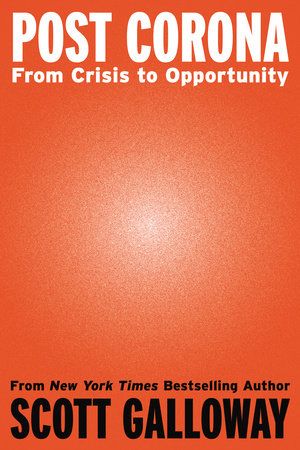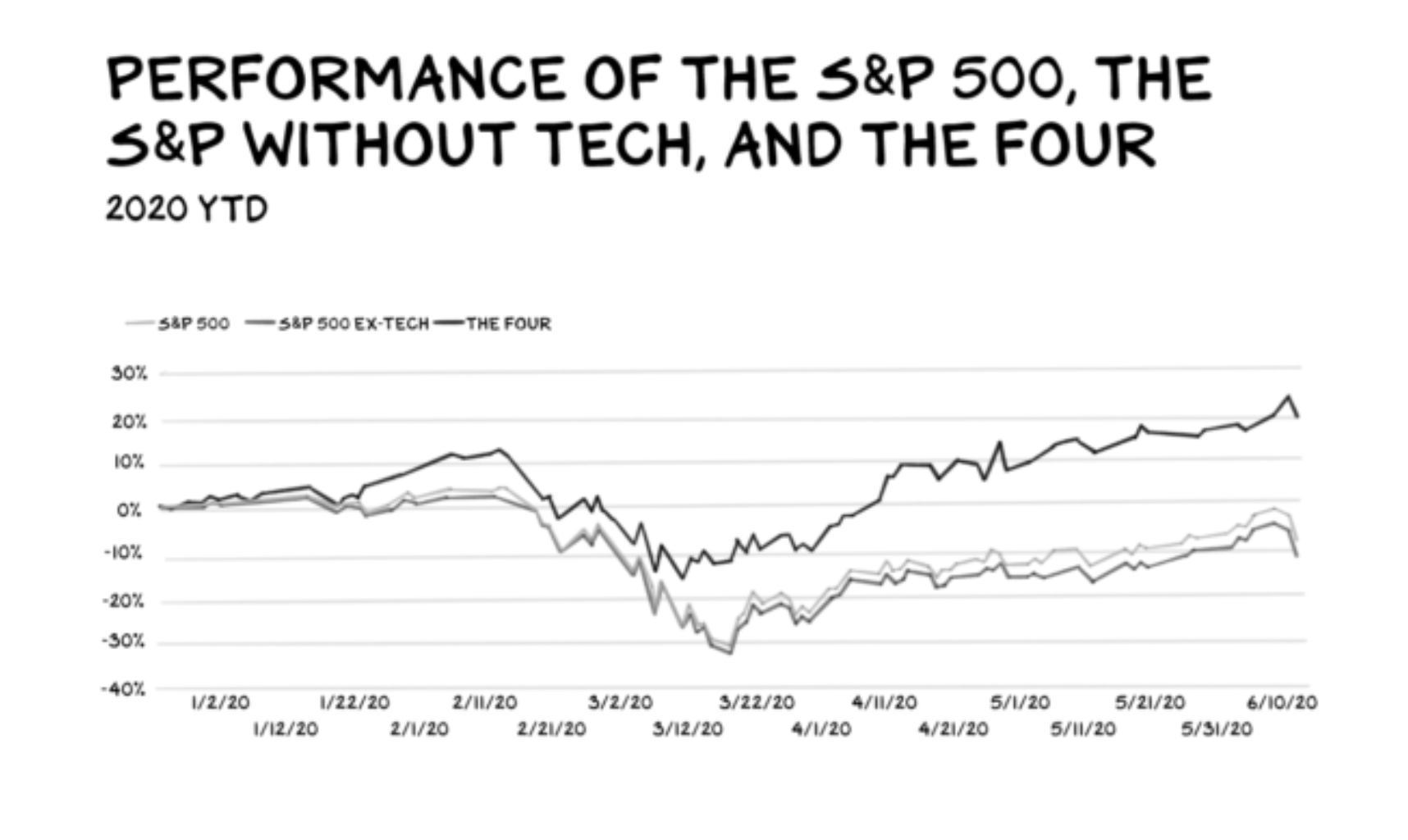
Post Corona
Rating: 9/10
Author: Scott Galloway Read The OriginalHigh-Level Thoughts
Definitely worth the read, there were so many mind-blowing facts throughout the book, for example, did you know people who take their own life are eight times more likely than average to be in debt? After finishing the book I was full of hope and energy because even during times like these, there is so much opportunity if you look in the right place. Post Corona has given me a glimpse of what the next ten years will look like, some of it very bad and some of it very promising. What you will do with that information is up to you!
Post Corona Summary
- COVID-19 has become a time accelerator where months have turned into years -> companies, higher education, and health care have all been changed for good.
- The Big Four have become much more powerful and are the core reason why we are in a bull market during a pandemic.
- Almost every industry is ripe for disruption but is becoming increasingly harder to succeed considering the rich just get richer with the help of our own government.
Post Corona Book Notes and Quotes
1) Covid & The Culling
- What we experience is change, not time. Aristotle observed that time does not exist without change, because what we call time is simply our measurement of the difference between “before” and “after.”
- Time is malleable, paced by change.
- First, the pandemic’s most enduring impact will be as an accelerant.
- Second, in any crisis there is opportunity; the greater and more disruptive the crisis, the greater the opportunities.
- “Nothing can happen for decades, and then decades can happen in weeks.”
- At the beginning of 2020, approximately 16% of retail was transacted via digital channels. Eight weeks after the pandemic reached the U.S. (March to mid-April), that number leapt to 27% . . .
- It took Apple 42 years to reach $1 trillion in value, and 20 weeks to accelerate from $1 trillion to $2 trillion (March to August 2020).
- Half of U.S. households have had at least one person lose a job or take a pay cut because of the outbreak.2 Households with income below $40,000 were hit hardest—almost 40% were laid off or furloughed by early April, compared to just 13% of households with income over $100,000.
- Sixty percent of jobs that pay over $100,000 can be done from home, compared to only 10% of those that pay under $40,000.
- social media and the ease of access to data on the internet has made it much harder for companies to pretend.
- BuzzFeed and Yelp have seen display ads on site decline 40–70% in 2020 vs. 2019 and are in the ICU. Vox, HuffPo, and Vice will follow. Some will make it out. Some.
- Two business models:
- buy something and sell it at a higher cost.
- Give something away and then monetize your customers.
2) The Big Four

- Apple is now the largest player in the watch business—by a factor of four.
- Quibi.7 Neither has a flywheel or a value proposition strong enough to justify another monthly subscription.
- (Roku), which together with Amazon Fire TV accounts for 70% of streaming video viewership.
- Now over 20% of Amazon’s revenue comes from Marketplace.
3) Other Disruptors 1054
- The number of U.S. IPOs has declined 88% from 1996 to 2016.
- The average age of a company up for IPO increased from three to eight years over the last 20 years.
- A retail store’s profitability is correlated with proximity to HQ. Sequoia Capital was the lead investor in my second firm, and the partner on our board told me a key tenet was they would not invest in a firm the partner could not drive to.
- Apple has cash worth 200 unicorns ($200 billion) on its balance sheet. Google has $120 billion.
- First, the industry you are entering is the crucial context. Sectors that have raised prices faster than inflation, without an equivalent increase in innovation, are the sectors where disruption is more likely.
- The T stands for “trillion”—these are the traits that give a company a chance at a trillion-dollar valuation. The eight elements of the T Algorithm are as follows:
- Appealing to human instinct
- Accelerant Balancing growth and margins
- Rundle Vertical integration
- Benjamin Button products -> Products or services that age in reverse (get more, rather than less, valuable to users over time) due to network effects.
- Visionary storytelling
- Likability
- Vertical integration -> A firm’s ability to control the end-to-end customer experience by controlling as much of the value chain as possible.
- hotels are usually separate LLCs so one hotel can declare bankruptcy without taking down the whole company.
4) Higher Education
- Wealthy kids today are over twice as likely to go to college as poor kids, and over five times as likely to attend an elite school.
- At 38 of the top 100 colleges in America, including 5 of the Ivies, there are more students from the top 1% of income than there are from the bottom 60%.9 You could argue that at this point, the Ivy League undergraduate programs are not colleges, but hedge funds that educate the children of their investors.
- Beginning in 2026, the number of graduating high school seniors is projected to decline by 9%.
- Just as retail closures are accelerating from 9,500 stores in 2019 to 25,000+ in 2020,23 we’re going to see hundreds of universities begin a death march.
- Ninety percent of kids who defer and take a gap year return to college and are more likely to graduate, with better grades.
5 ) THE COMMONWEALTH
- That’s the trick of capitalism. By directing our ambition and our energy toward productive labor, it turns selfishness into wealth and stakeholder value.
- As a species, we are not very good at attribution—connecting our individual actions with the broader world or thinking long term.
- Disease kills far more people than war—we spend over $3 trillion treating people with chronic disease every year.6 Yet in 2019, the Centers for Disease Control and Prevention’s budget was just over $7 billion.
- However, history tells us, nearly every bailout, whether it’s Chrysler or Long-Term Capital Management, only creates moral hazard that results in a bigger failure and a more costly bailout. Our $1.5 billion bailout of Chrysler in 1979 graduated to a $12.5 billion bailout, bankruptcy, and a sale to Fiat in 2009.
- And the corporations that benefited didn’t save for a rainy day (which always comes), or pay it out to their workers so they could build up a protective cushion of wealth, or invest in capital projects that would grow the economy. Instead they poured it into dividends and stock buybacks, juicing executive compensation (from 2017 to 2019 the CEOs of Delta, American, United, and Carnival Cruises earned over $150 million in total compensation)
- The 1918 influenza epidemic was devastating, but it was followed by the Roaring Twenties.
- the top 0.1% now own more of the nation’s wealth than the bottom 80%.
- When I sold my last company, L2, in 2017, I paid an effective tax rate of 17–18%. I paid 22.8% federal, but the first $10 million were tax free, thanks to Section 1202 of the tax code. Section 1202 is a tax break for early shareholders, meant to encourage start-ups.
- Never been easier to become a billionaire, or harder to become a millionaire.
- People who take their own life are eight times more likely than average to be in debt.
- For every 100 points your credit score increases, your risk of dying in the next three months declines by 4.4%.16 In the U.S., money is literally life.
- Study after study has found that in today’s America, the biggest determinant of an individual’s economic success is not talent, it’s not hard work, and it’s not even luck. It’s how much money their parents have.
- In 2019, the acceptance rate at UCLA was 12%. Put another way, it’s five times as difficult to access the upward mobility that was within reach three decades ago.
- Eighty percent of venture capitalists—the gatekeepers of the entrepreneurial economy—are men, and most of them are white.
- This is why we need a strong government, to counter human nature, to balance fast thinking and selfishness with slow thinking and community.
- The youth suicide rate has increased 56% in a decade.
- We don’t pay government scientists and researchers enough (and we don’t listen to the ones we do hire), and the best and the brightest go instead to Google or Amazon. Then we ask the DOJ and the FTC to restrain these corporate titans.
- Amazon has more full-time lobbyists in DC than there are sitting U.S. senators.
- It matters much less who you vote for, than that you vote at all. The point is to signal that you are worth a politician’s time. You want to know why we have a system that’s designed to transfer wealth from the young to the old? Because old people vote. Those over 65 are twice as likely to vote as people under 30. And
- Happiness is not only a function of what you have, but what you don’t have. Specifically, an absence of fear.
- A step backward, after making a wrong turn, is a step in the right direction. —Kurt Vonnegut